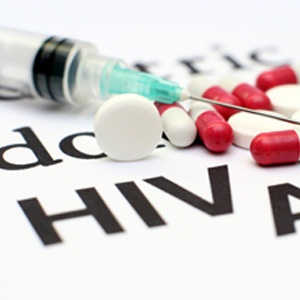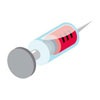
According to the experts, the Department of Health is paying much more than it needs to for a key HIV drug. And it's not only South Africa's 5.5 million HIV-positive people who feel the pain: every South African taxpayer is paying a price for the alleged foot-dragging of both the state and a drugs company.
Is government's failure to negotiate better deals and to enforce licencing powers granted by international treaties a symptom of its reluctance to accept the science of HIV? And, are certain pharmaceutical companies benefiting from the Aids pandemic in an anti-competitive way?
The battle for cheaper Efavirenz
It is estimated that government is currently providing almost 400 000 state patients with one of two first-line highly active antiretroviral therapy (HAART) regimens – both consisting of three different drugs. One of the drug combinations contains the non-nucleoside reverse transcriptase inhibitor (NNRTI) drug Efavirenz.
According to figures from the Western Cape Antiretroviral Programme Monitoring report 2006, quoted by the HIV/Aids activist group Treatment Action Campaign (TAC), 64 cents out of every rand spent on first-line drugs is spent on Efavirenz. This makes Efavirenz alone more expensive than the two other drugs combined.
The report also stated that "Efavirenz use is the most significant driver of antiretroviral drug costs."
Generic versions of Efavirenz are available in other countries at significantly lower prices.
Prices quoted by the Clinton Foundation as well as the September 2007 edition of Medicins Sans Frontieres' report Untangling the Web of Price Reductions, shows that the South African government is paying between 15% and 30% more than other countries for the drug.
Why we're paying more
Until recently, Merck, Sharpe and Dohme (MSD – Merck international's South African subsidiary) was the only company selling Efavirenz in South Africa. Merck holds the patent, and other companies wanting to make the drug need to be issued a licence.
Such licences were granted to Thembalami Pharmaceuticals (no longer in existence)and Aspen (which has not yet brought a product to market).
In August 2007, Adcock Ingram was granted a licence, and in November it brought the first generic Efavirenz product to the SA market – although the price is only marginally cheaper than that of MSD's product. (The most recent comparison we have is R124 for Adcock's 600mg product vs R135.53 for MSD's - both prices excluding VAT.)
Critics contend that more competition will drive prices down, and that by refusing to grant more licenses, MSD is in a sense conspiring to keep the price high.
Anti-competitive behaviour?
In November 2007 the TAC and the Aids Law Project (ALP) lodged a complaint with the Competition Commission, charging MSD and Merck with failing to licence Efavirenz on "reasonable terms".
Their first concern is that MSD has granted so few licences. Two pharmaceutical companies, Sonke Pharmaceuticals and Ciplamedpro, already have Efavirenz products registered with the South African Medicines Control Council, but are not allowed to sell them in South Africa.
According to Nic de Jongh, medical director at Ciplamedpro, the company could have an Efavirenz product available in South Africa within six weeks of being granted a licence.
Similarly, Sonke Pharmaceuticals are already producing Efavirenz in South Africa and can have a product on the market by February (2008), according to Sotse Segoneco, CEO of Sonke. He also said that their 600mg Efavirenz product would be 20% cheaper than MSD's.
Why Sonke and Ciplamedpro have not been granted licences is unclear.
Open to discussion
When challenged on why so few licenses have been granted, MSD replied that "Merck continues to be open to discussing licencing proposals for the manufacture and supply of available ARV's in line with supporting the Government's objectives as outlined in the National Strategic Plan, with companies who request licences."
The company insisted that objective criteria are used for the granting of licenses. "This is very important to ensure safe and effective medicines for patients," said MSD, "as well as security of sustainable supply of ARVs. The criteria put in place are to address these concerns."
Segoneco however holds that there are "no valid reasons whatsoever" to refuse licences. He points out that Sonke/Ranbaxy and Ciplamedpro/Cipla are providing antiretrovirals globally at accessible prices.
Bad relations
In response to the TAC/ALP complaint to the competition commission, MSD said: "We are disappointed that notwithstanding what we believed was constructive engagement, the ALP apparently decided to file the complaint. The company denies that it has violated the Competition Act, and will co-operate in full with the Competition Commission in an investigation."
In contrast, the TAC has described the almost six-year-long negotiations as progressing agonisingly slowly. It has, however, indicated that it remains open to further discussions. The TAC said in a press release that it "has no interest in protracted litigation and would prefer for the parties to negotiate a settlement in the public interest. If such a settlement could be reached, as was the case in 2003 with GSK and BI, the TAC would be prepared to withdraw its complaint."
Yet the TAC's Zackie Achmat told Health24 that, "the sooner the Competition Commission decides this matter, the more lives can be saved. Merck has attempted to hoodwink us with promises that they will licence a range of generic companies for more than four years. This has allowed them to abuse their patent and profiteer from illness."
In a similarly frustrated vein, a senior figure at a local pharmaceutical company described, on condition of anonymity, how four years of correspondence with MSD had been typified by vague answers and a lack of clarity from MSD.
And what about government?
Faced with similar problems, the Thai and Brazilian governments have issued compulsory licences, which they are allowed to do under current international treaties. In such cases, other companies are given the right to produce and sell Efavirenz irrespective of whether Merck grants a licence.
According to the ALP's Jonathan Berger, "a minister of state could issue a licence 'for a public purpose', acting in terms of Section 4 of the Patents Act." Berger argues there is a strong case for the Minister of Health to be forced to use this power.
When asked why the Department of Health (DoH) has not issued a compulsory licence for Efavirenz, a spokesperson replied that "we believe compulsory licences are just one of – and not the only – means of making medicines affordable."
Honouring obligations
The DoH continued that: "It must be recalled that the government must honour the current contractual obligations of the tender for the purchase of antiretrovirals. At the time of the award of this tender, MSD's price was more favourable compared to generic products on the market at the time. When the current tender expires (in mid-2008), a full evaluation of the fairness and appropriateness of prices will be undertaken."
The fact is that at the time of the tender there was no generic product on the local market; and at present there is only one.
The DoH admits that "generic products are generally between 30% and 40% lower in price than the originator when there are two to three players". Given this admission, and the fact that the DoH has also admitted to being concerned over the price of Efavirenz, it remains unclear why it hasn't been able to successfully negotiate prices in line with those in other countries.
According to Berger, "there may be political pressure not to act. But countries such as Thailand and Brazil were able to withstand the pressure and issue licences. It's likely that South Africa would not be subjected to the same pressure, given the size of our Aids problem."
No combinations
A second aspect of the TAC/ALP complaint to the Competition Commission relates to the limited terms of current Efavirenz licences – particularly regarding the lack of licences for co-formulations. Such co-formulations are widely seen as the future of first-line HIV treatment.
According to HealthDayNews, about half of newly diagnosed HIV patients in the US are receiving the drug Atripla (a combination of Efavirenz, Tenofovir and Emtricitabine). Atripla has also recently been approved in Europe.
Atripla significantly simplifies Aids treatment by reducing it to a single, once-daily pill – something that is expected to significantly improve compliance.
One combination that is likely to come to market should Efavirenz licences be expanded, is the co-formulation of Efavirenz, Tenofovir and Lamivudine. This co-formulation is considered to be therapeutically equivalent to Atripla and is currently selling for as much as 45% less than Atripla.
Thus, should the current licences not be expanded in time for the next state tender, it is likely that the South African government will continue to pay more than many other countries for HIV drugs.
- (Marcus Low, January 2008, Health24)
Sources:
Untangling the web (10th version), September 2007 - Medicins Sans Frontieres.
Treatment Action Campaign press release on their complaint to the competition commission.
Western Cape Antiretroviral Programme Monitoring report 2006.
Summery report from the Global price reporting mechanism on anti-retroviral drugs, July 2007.
CHAI Antiretroviral price list, 05/08/2007 - Clinton Foundation HIV/Aids Initiative.
Read more:
HIV/Aids Centre
How things got so bad




 Publications
Publications
 Partners
Partners















